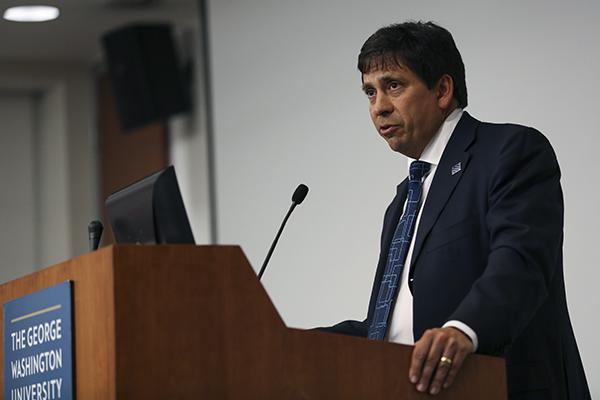Two years into a revamp of faculty policies and rules, the Board of Trustees and Faculty Senate continue to debate the best ways for faculty to participate in decision-making processes.
The Board of Trustees passed three resolutions this summer addressing faculty governance in hopes that the changes will better allow the University to achieve a series of long-term goals laid out in the strategic plan. And while board members said in a meeting Friday they prioritize working with faculty, some members of the Faculty Senate questioned the board’s ability to take faculty input into account.
Some members of the Faculty Senate did not view the board’s resolutions — which ignored Faculty Senate changes to faculty tenure and dean searches — as collaborative, but felt that board members were ignoring the senate’s recommendations. Faculty questioned whether the Board of Trustees considered their input when they passed their own resolutions at a retreat in June.
“Did the full board actually look at the three resolutions we passed?” Marie Price, a geography professor, asked Board of Trustees chair Nelson Carbonell at the meeting.
Carbonell said the resolutions were presented in-person to the academic affairs committee of the Board of Trustees, and the rest of the board received the resolutions. He said he “assumed they read it, like professors assume their students read.”
The Faculty Senate passed three resolutions at their May 8 meeting, which were then presented to the Board of Trustees a week later. Those changes to the University’s faculty regulations included updates to individual schools’ rules, the percentage of tenured faculty in each school and how deans are selected and reviewed. In June, the Board of Trustees passed three of their own resolutions on those topics, which had some similarities but were different versions of the Faculty Senate resolutions.
In their own resolutions, the Board of Trustees did not limit the number of non-tenured faculty in schools, and voted to create a University-wide personnel committee to evaluate faculty for promotion — moves the Faculty Senate did not endorse. Changes to dean searches and reviews remained largely unchanged between the senate and board resolutions.
Because the Board of Trustees passed resolutions without seeking approval by the Faculty Senate, Harold Griesshammer, an associate professor of theoretical nuclear physics, questioned the power that the board yields over the body of faculty. Faculty at GW are given a role in determining administrative decisions, a model called shared governance.

“This was a simple matter of waiting for the senate to approve something straightforward and the board chose to just move on. How does that increase shared governance?” Griesshamer said.
Charles Garris, the chair of the Faculty Senate’s executive committee, said it is recommended but not required that the board bring its resolutions back to the Faculty Senate for approval, and that this session the board chose to “operate on their own time table.”
Carbonell said during Friday’s Faculty Senate meeting that conferences between faculty and board members to fairly evaluate procedures among faculty over the past two years went “extremely well.” Faculty were interviewed, participated in town halls and submitted feedback in online surveys.
“Our efforts led to a more collaborative faculty governance system,” Carbonell said during his presentation.
While Carbonell made the two years of work seem like smooth sailing, Garris, a professor of mechanical engineering, compared the process to more of a roller coaster ride.
“We’ve had our ups and we’ve had our downs along the way,” Garris said.
The current group of board members approach their relationship with the Faculty Senate differently than previous Boards of Trustees, Garris said in an interview. He said this is one of the first times a board has changed what faculty present to them, even though the group has always had the ability to do so.
Garris said Carbonell has taken a proactive approach in his position as chair and is willing to present ideas about ways to improve the University to staff and administrators, rather than waiting for the ideas to land on his desk.
“Because other boards didn’t choose to exercise that right, doesn’t mean they can’t, but there’s some bitterness about that among faculty,” Garris said. “Very few times in the history of GW have they wordsmithed resolutions put forward by the faculty.”







